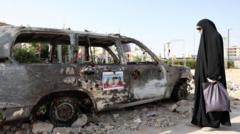As of June 24, 2025, Israel and Iran have officially announced a cease-fire after 12 days of escalating conflict that raised fears of a broader regional war, with both sides releasing statements confirming the truce.
Israel and Iran Announce Cease-Fire Amid Ongoing Hostilities

Israel and Iran Announce Cease-Fire Amid Ongoing Hostilities
A cease-fire has been declared by Israel and Iran following intense hostilities, with U.S. President Trump facilitating the agreement amidst ongoing regional tensions.
June 24, 2025, 2:21 a.m. ET
In a significant development, Israel has announced an agreement for a cease-fire with Iran, effectively ending 12 days of hostilities marked by missile exchanges and airstrikes. The announcement was made on Tuesday morning, with President Trump playing a key role in facilitating the truce after discussions involving key officials from both sides. An earlier tweet from Trump indicated that the cease-fire was indeed in place and urged all parties to respect it.
The conflict saw a series of missile strikes from Iran targeting Israeli territories, including a high-profile strike that resulted in casualties and destruction in Beersheba. Reports indicate that at least four individuals were killed and multiple others injured due to Iranian missile fire. In response, Israel attempted to neutralize the threats through its defense systems but faced multiple missile alerts that disrupted civilian life across the region.
Footage captured early Tuesday morning showed the aftermath of the missile strikes, with emergency services racing to treat the wounded and assess damage in residential areas. A state of emergency continues to be observed in Israel, with schools and nonessential businesses remaining closed as a precaution.
Despite the cease-fire's announcement, tensions remain high, and there are unverified reports of renewed Israeli airstrikes against Iranian positions in retaliation for previous attacks. As the situation evolves, the reactions of both governments and the responses from their military establishments will be crucial in determining whether the cease-fire will hold.
The role of international actors, specifically the U.S., highlights ongoing complexities within the region, as President Trump’s prior missile strikes on Iranian nuclear sites are seen as pivotal in shaping the current dynamics. The international community’s focus now shifts to the sustainability of this cease-fire and the broader implications for peace in the Middle East.
In a significant development, Israel has announced an agreement for a cease-fire with Iran, effectively ending 12 days of hostilities marked by missile exchanges and airstrikes. The announcement was made on Tuesday morning, with President Trump playing a key role in facilitating the truce after discussions involving key officials from both sides. An earlier tweet from Trump indicated that the cease-fire was indeed in place and urged all parties to respect it.
The conflict saw a series of missile strikes from Iran targeting Israeli territories, including a high-profile strike that resulted in casualties and destruction in Beersheba. Reports indicate that at least four individuals were killed and multiple others injured due to Iranian missile fire. In response, Israel attempted to neutralize the threats through its defense systems but faced multiple missile alerts that disrupted civilian life across the region.
Footage captured early Tuesday morning showed the aftermath of the missile strikes, with emergency services racing to treat the wounded and assess damage in residential areas. A state of emergency continues to be observed in Israel, with schools and nonessential businesses remaining closed as a precaution.
Despite the cease-fire's announcement, tensions remain high, and there are unverified reports of renewed Israeli airstrikes against Iranian positions in retaliation for previous attacks. As the situation evolves, the reactions of both governments and the responses from their military establishments will be crucial in determining whether the cease-fire will hold.
The role of international actors, specifically the U.S., highlights ongoing complexities within the region, as President Trump’s prior missile strikes on Iranian nuclear sites are seen as pivotal in shaping the current dynamics. The international community’s focus now shifts to the sustainability of this cease-fire and the broader implications for peace in the Middle East.






















